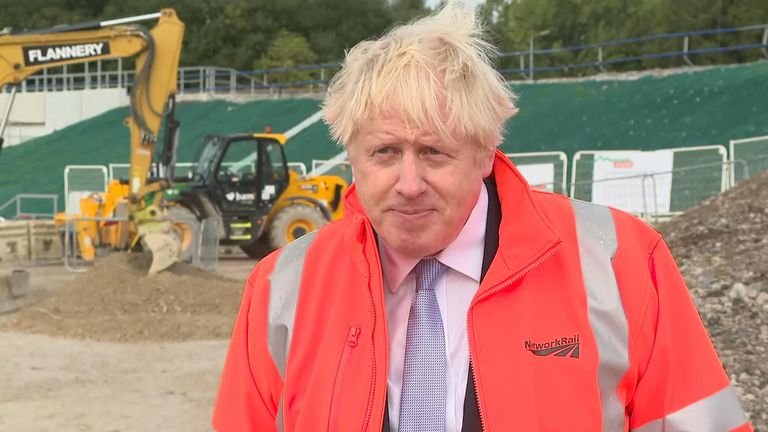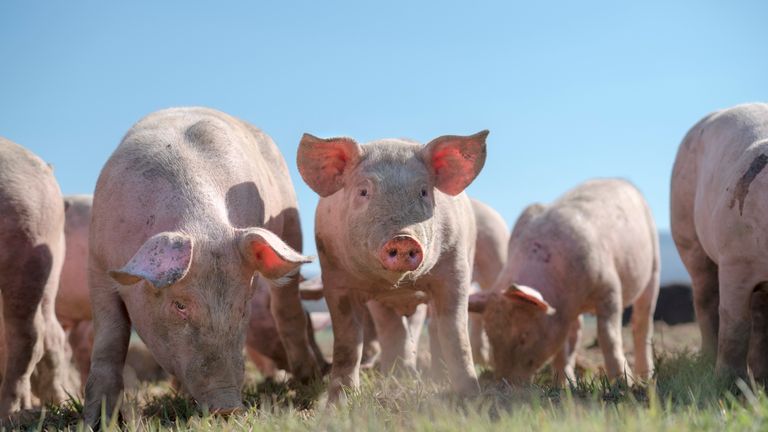Greggs warns on rising prices but declares sausage rolls are ‘safe’ from shortages
Greggs has announced plans to accelerate the pace of new store openings despite admitting disruption from staff and ingredient shortages in the UK supply chain crisis.
The bakery chain, which had admitted “temporary interruptions” in the supply of some ingredients just over a month ago, said on Tuesday that it was expecting cost pressures to only increase as the winter got into gear – raising the prospect of those being passed on to customers.
However, chief executive Roger Whiteside pledged that supplies of its famous sausage rolls would be maintained despite the crisis facing the pork industry that has left over 100,000 pigs backed-up on farms.
Greggs revealed a 3.5% rise in like-for-like sales in the third quarter of its financial year compared to pre-COVID crisis levels despite the headwinds facing the business and wider economy that are threatening shortages over the key Christmas season.
Greggs, which has more than 2,100 stores across the UK, said it benefited from “staycations” during August and that effect continued into September as more people returned to offices.
“Subject to any unexpected COVID disruption we expect the full-year outcome to be ahead of our previous expectations,” it said.
The company added that the strong sales performance had given it confidence to accelerate the pace of new store openings to 150 net new shops next year from 100 expected during 2021.
That was despite the current difficulty hiring new workers amid record vacancy levels.
Greggs said it was also looking to extend evening trading to more shops and grow app-generated and delivery sales.
The company said: “Greggs has not been immune to the well-publicised pressures on staffing and supply chains and we have seen some disruption to the availability of labour and supply of ingredients and products in recent months.
“Food input inflation pressures are also increasing; whilst we have short-term protection as a result of our forward buying positions we expect costs to increase towards the end of 2021 and into 2022.”
Rising costs are a consequence of many factors affecting the global economy from energy bills to shipping costs.
Domestically, the acute HGV driver shortage and overall lack of workers – from the likes of skilled butchers to even shop assistants – have combined to push up wages and erode margins further.
While the inflation problem is certainly Europe-wide, it is more acute in this country as Brexit laws limit immigration for work purposes – ending the EU “open door” policy.
While the government has bowed to industry pressure and launched a temporary visa scheme to admit lorry drivers from the continent, businesses have warned the time-limited scheme, until Christmas, will fail to lure enough people.
Boris Johnson told the BBC on Tuesday that 127 visas had been granted so far – with up to 5,000 allowed under the scheme – an the number demonstrated the impact of the Europe-wide shortage.
A key part of the PM’s post-Brexit strategy is that wages and employment can only grow if the UK weans itself off cheap labour from abroad.
Commenting on the supply problems at Greggs, Mr Whiteside told the Reuters news agency: “The sausage roll is safe, that’s one thing we haven’t gone short of.”
But he said of the wider supply chain issues: “I wake up every morning and I find out what’s short that day because something has been disrupted… there’s some different thing going on every day, with some different item.”
Of other companies reporting on Tuesday, furniture retailer ScS said it was also enduring disruption.
“We are cognisant of the ongoing challenges we, and many other businesses, are facing with regards to the supply chain, including driver shortages, raw material increases and shipping costs and delays,” it warned investors.
Shares in Greggs rose by more than 4% at the open and were later more than 9% up – taking the stock to a record high.
Ross Hindle, analyst at Third Bridge, said that while sales were encouraging Greggs faced a price problem in the months ahead.
“From a pricing point of view, Greggs chose to pass on the chancellor’s VAT discount to their customers.
“They now face the tricky challenge of putting their prices back up when VAT increases to 12.5% at the end of September, and 20% in 2022.
“This may mean short-term margin pressure for the group especially in the face of rising inflation.”





